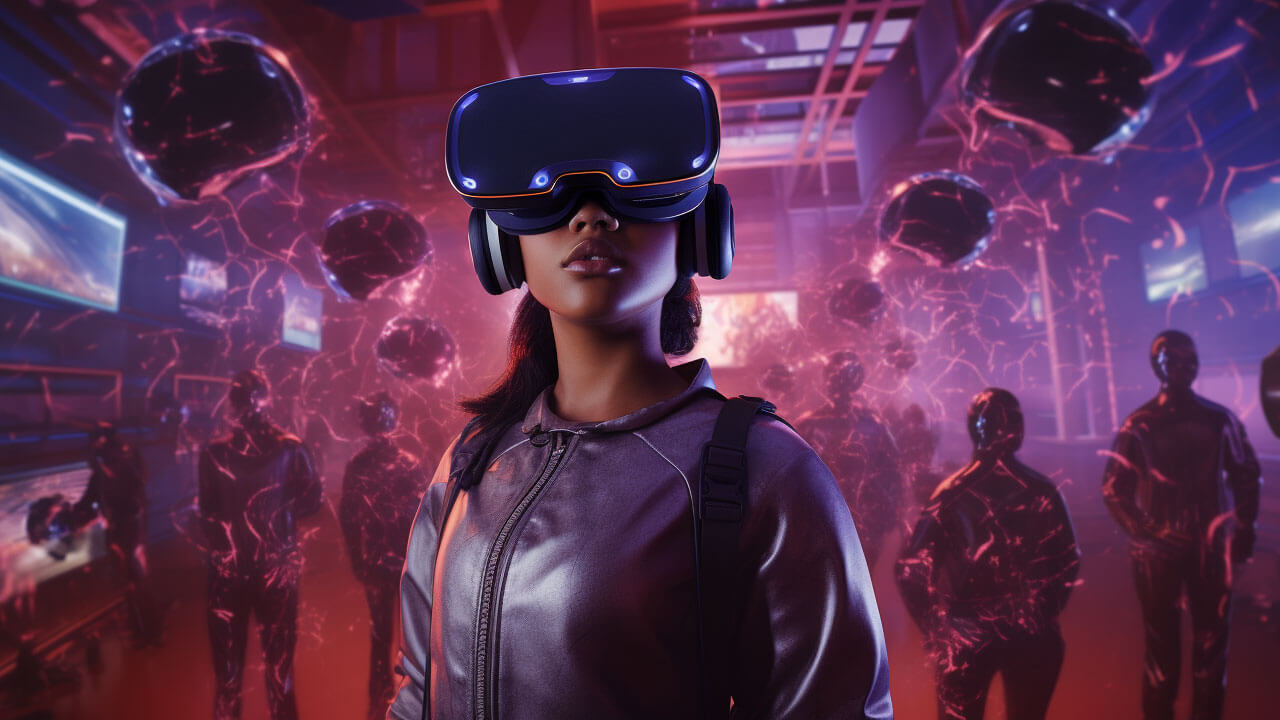The Unfolding Frontier: Exploring the World of Metaverse Games
The concept of a metaverse, a persistent virtual world accessible through various technologies, has captured the imagination of tech giants, investors, and gamers alike. Within this burgeoning digital landscape, a new breed of games is emerging: metaverse games. These interactive experiences transcend the limitations of traditional games, offering players unprecedented levels of immersion, ownership, and social connection. This article delves into the world of metaverse games, exploring their core characteristics, the potential they hold, and the challenges they face in shaping the future of gaming.
Beyond Pixels: The Core Characteristics of Metaverse Games

Unlike traditional games confined to a developer-controlled environment, metaverse games exist within a persistent virtual world. Players don’t just play; they inhabit this world, interacting with it and each other in meaningful ways. Here are some key characteristics that define a metaverse game:
- Persistence: The metaverse world continues to exist and evolve even when players are offline.
- Avatars and Identity: Players inhabit the metaverse through avatars, digital representations of themselves that can be customized and carried over between experiences.
- User-Generated Content (UGC): Players have the ability to create and contribute content to the metaverse, fostering a sense of ownership and community.
- Virtual Economies: Metaverse games often incorporate virtual economies, allowing players to earn, spend, and trade digital assets within the game world.
- Interoperability: Ideally, metaverse games will allow players to move seamlessly between different virtual spaces, taking their avatars and assets with them.
These characteristics combine to create a truly immersive experience. Players don’t just play a game; they become active participants in a virtual society, shaping the world around them.
The Potential of Metaverse Games: A Glimpse into the Future
The potential of metaverse games extends far beyond mere entertainment. Here are some exciting possibilities:
- Social Interaction and Community Building: Metaverse games can foster a strong sense of community, allowing people to connect and socialize in innovative ways regardless of geographical location.
- Education and Training: Educational experiences within the metaverse can be highly engaging and immersive, promoting deeper understanding and knowledge retention.
- Virtual Economies and Earning Potential: The ability to earn and own virtual assets within metaverse games opens doors for new economic opportunities within the digital realm.
- Unleashing Creativity: Metaverse games provide a platform for boundless creativity, allowing players to design, build, and share their creations within the virtual world.
- Revolutionizing Entertainment: Metaverse games have the potential to revolutionize how we experience entertainment, offering interactive experiences that blur the lines between reality and virtuality.
Challenges and Considerations: Navigating the Uncharted Territory
Despite their immense potential, metaverse games still face significant challenges.
- Technological Limitations: Current technology may struggle to provide the level of immersion, processing power, and scalability needed for truly expansive metaverse experiences.
- Accessibility and Inclusivity: Ensuring equitable access to metaverse games for people with varying technological capabilities and financial resources is crucial.
- Regulation and Governance: The need for clear regulations and governance frameworks to address issues like intellectual property, data privacy, and online safety within the metaverse is paramount.
- Addiction and Mental Health: The immersive nature of metaverse games raises concerns about potential addiction and the impact on mental health, necessitating responsible design and user support systems.
- Monetization and Sustainability: Finding sustainable models for metaverse games that balance user enjoyment with the need for revenue generation is critical for long-term success.
Addressing these challenges will be crucial for realizing the full potential of metaverse games and ensuring their positive impact on society.
The Evolving Landscape: A Look at Existing and Upcoming Metaverse Games
The metaverse game landscape is still in its early stages, but several pioneering projects are paving the way:
- The Sandbox: This popular metaverse game allows players to purchase virtual land, create voxel-based experiences, and interact with others in a vast, user-generated world.
- Decentraland: Built on the Ethereum blockchain, Decentraland boasts a virtual world where players can own land, build structures, and participate in a decentralized economy.
- Axie Infinity: This play-to-earn game allows players to collect, breed, and battle adorable creatures called Axies, with real-world monetary value attached to these digital assets.
- Roblox: While not strictly a metaverse game yet, Roblox boasts a massive user base and a platform for user-generated content, potentially laying the groundwork for a more immersive metaverse experience in the future.
- Meta (formerly Facebook): With its focus on virtual reality (VR) technology and the creation of the Horizon platform, Meta is a major player to watch in the development of metaverse games.
As technology advances and these challenges are addressed, we can expect a surge in innovative metaverse games offering even more immersive and engaging experiences.
Conclusion: The Future of Gaming is Here, But the Journey Has Just Begun
The metaverse represents a paradigm shift in the gaming industry. Metaverse games are not just about playing; they are about building, owning, and participating in a virtual society with limitless potential. While challenges remain, the potential benefits are undeniable. From fostering deeper social connections to revolutionizing education and entertainment, metaverse games have the power to reshape our digital experiences in profound ways.
Looking Ahead: Key Questions and Areas of Exploration
As we delve deeper into the world of metaverse games, some key questions remain:
- How will interoperability develop? Will players be able to seamlessly move between different metaverse experiences, creating a truly interconnected virtual world?
- What role will artificial intelligence (AI) play in metaverse games? AI can enhance immersion by creating more believable virtual characters and dynamic environments.
- How will ethical considerations be addressed? Issues like data privacy, online harassment, and addiction prevention need to be carefully considered within the metaverse.
- What impact will metaverse games have on traditional game design? Will traditional single-player and multiplayer experiences coexist with metaverse games, or will the lines continue to blur?
Exploring these questions and actively addressing the challenges will be crucial for shaping a responsible and thriving metaverse game ecosystem.
The Road Ahead: Collaboration and Responsible Development
The development of a robust and successful metaverse requires collaboration between various stakeholders.
- Game Developers: Creating innovative and engaging metaverse experiences that cater to diverse player preferences is key.
- Technology Companies: Continued advancements in VR, augmented reality (AR), and blockchain technology are essential for realizing the full potential of the metaverse.
- Policymakers: Establishing clear regulations and frameworks will foster trust and ensure a safe and inclusive metaverse environment.
- Educators and Researchers: Exploring the educational and social implications of metaverse games is crucial for responsible development.
- Gamers: Active participation and feedback from the gaming community are vital for shaping the future of metaverse games.
By working together, these stakeholders can ensure that metaverse games become a force for good, fostering creativity, connection, and positive societal change.





